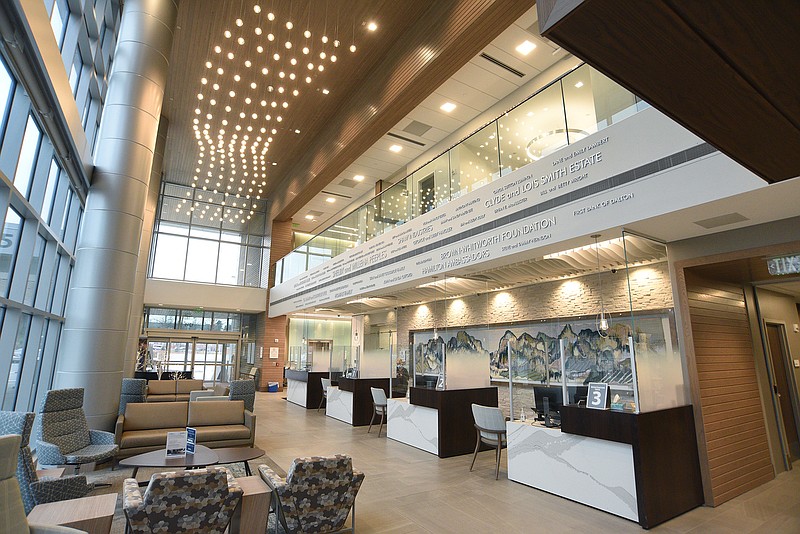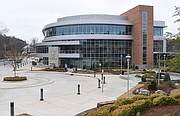DALTON, Ga. - What if your doctor's office was a treehouse full of toys with an exam room with a porcupine theme?
The whimsical forest theme of the Anna Shaw Children's Institute is meant to be more than just fun for patients, according to Executive Director Terri Woodruff.
Philanthropist and flooring industry juggernaut Bob Shaw approached Hamilton Health Care System CEO Jeff Myers in 2017 about building a new facility for young patients with developmental disabilities in honor of Shaw's late wife, who had a passion for helping children.
Their vision was to bring the level of care typically found only in larger cities to the Northwest Georgia manufacturing town - which has a metropolitan statistical area of about 145,000 people - by creating a facility where children younger than 11 with any type of developmental delay could be diagnosed, treated, receive therapy and support services along with their families.
"Children from our community were having to travel one to two to three hours one way to receive services, and that's a long way if you have a child with special needs and they have two or three appointments a week," Woodruff said during a recent site visit by a reporter. He was one of several executives and doctors interviewed.
The 54,000-square-foot children's institute, which opened in April 2019, is intentionally designed to feel unlike a medical building, centered around a 46-foot "sugar maple" and play area. It's also among the numerous expanded services and infrastructure improvements made in the past five years at Hamilton Health Care System, which is somewhat of an anomaly in today's hospital industry.
An increasing number of community hospitals across the nation have over the years opted to join larger systems, often as means to remain financially viable. As of 2020, 68% of the nation's 5,139 community hospitals were part of a larger system, according to the American Hospital Association's most recent annual survey.
However, Hamilton has managed to not only survive as the Chattanooga region's only remaining independent community hospital but thrive enough to invest roughly $220 million in expanded services and infrastructure improvements in the past five years.
Of those investments, $100-million-worth have occurred since 2019, including a new cancer institute and open-heart surgery program. Both projects were already underway before the COVID-19 pandemic struck.
The efforts are working to broaden Hamilton's footprint and draw physicians from some of the nation's premier medical centers to practice in Dalton, Georgia - a city much-better known as the carpet capital of the world than a health care hub.
"We've been invisible for a very long time," said Myers, the CEO. "When I'm up in Chattanooga, so many people that I talk to think of Hamilton as a 40-, 50-bed hospital, and they have no idea what really is here. It's not just a premier campus, this is a premier physician community."
The nonprofit system, named after founder George Hamilton, includes a 282-bed acute care hospital, a skilled nursing facility, senior housing apartments, home health, hospice and a 75,000-square-foot fitness center.
Hamilton also holds the emergency medical services contract for Whitfield County and recently added family practice and internal medicine residency programs affiliated with the Medical College of Georgia to help train the next generation of doctors.
As part of its expansion, the hospital has managed to recruit numerous reputable physicians from across the region - such as well-known veteran heart surgeon Dr. Richard Morrison, who's been based in Chattanooga for more than four decades.
"Dr. Morrison and I started speaking four years ago about the future of open-heart surgery in the region, and it was clear that there was a need, so we put a lot of effort towards it," Myers said. "I'm a firm believer that talent attracts talent."
With Morrison leading Hamilton's new cardiac surgery program, which opened in 2021, the health system was also able to recruit interventional and structural cardiologist Dr. Jim Stewart from Emory hospital in Atlanta. Hamilton is now drawing more patients from Chattanooga and Atlanta - well beyond its primary service area of Whitfield and Murrary counties and secondary service areas of Catoosa and Gordon counties.
"We never built in any assumptions that we were going to be pulling referrals out of Chattanooga or out of Atlanta. That was certainly unexpected, and that is directly because of their [Morrison and Stewart] reputations," Myers said.
Hamilton's medical staff, which according to a 2019 news release included nearly 300 physicians, has grown 30% in the past five years, according to a hospital spokesperson.
(READ MORE: New 'smart' hospital in Ringgold, Georgia, advances towards summer groundbreaking)
Stewart said being part of a team able to build its program from the ground up is what attracted him to Hamilton, although he said people still often question why he left Atlanta for Dalton.
"Heart disease is everywhere, particularly in North Georgia and in Southeast Tennessee, so there's no shortage of patients," Stewart said. "We're really providing care that they may not have otherwise gotten, and we're doing things to just as high of standards as all of the revered places in the Southeast."
Before the new program, Myers said, Hamilton would transfer roughly 200 heart patients per year to Chattanooga so they could receive a higher level of care - which can take anywhere from 30 minutes to an hour and a half depending on traffic and capacity at the other hospitals.
"We've had a number of patients that have come to the emergency room that quite honestly, if we didn't have that service here, they would not have made it," Myers said.
Dr. Eric Turner, medical director of oncology, is another recent addition who now oversees the Peeples Cancer Institute, which opened in January 2020. Before the new center, Turner said cancer care was scattered across campus.
"The idea was to try to bring as much of that comprehensive care under one roof as possible to allow for a more combined, coordinated care for the patients," Turner said, noting that a handful of cancer services are still separate but will likely move to Peeples - which has an empty floor to allow continued expansion - in the future.
The four-story building is designed much like a modern hotel and is meant to feel inviting for patients and their families. It houses the medical oncology clinic, radiation oncology, breast and diagnostic imaging services and an outpatient infusion center with six private rooms and 20 semi-private bays with large windows and TVs.
One of the most notable additions to cancer care as of late, Turner said, is a high-risk genetics clinic for breast cancer screening. With the new open-heart surgery program up and running, program leaders are soon hoping to recruit a cardiothoracic surgeon to perform lung cancer surgeries, he said.
Similar to the cancer institute, the children's institute was designed with comfort in mind. An advisory council that included local health care professionals, educators and parents of children representing a range of disabilities - including autism, cerebral palsy and Down syndrome - provided input for the types of features the facility should include.
After 22 months of construction, the Anna Shaw Children's Institute opened its doors to the public in April 2019.
The building uses natural and LED lighting instead of fluorescent lights, which can be especially disruptive for patients with sensory issues, and has entrances at both the first and second floor so patients don't have to ride elevators.
Variations of gray, brown and green carpet line the first floor to mimic forest groundcover while also guiding patients to their destination. The color palette shifts more to blue as patients "climb" the centerpiece tree that extends through each floor, with the second floor resembling the tree canopy and the highest floor the tree top.
"When the kids come in, they're like, 'oh cool, a tree,' and they just start playing," Woodruff said. "We've had parents give us feedback that their child was not afraid to come here, and it really helped them to be calm for their appointments. It's very hard to assess a child if they're crying and they're frightened or scared, but it's easy if they're just playing."
Rooms are named after different woodland creatures, and furniture is made to climb on and comes in a range of textures, patterns and shapes, which Woodruff said is meant to aid in experiential learning.
Other features include family restrooms that contain both small and large toilets, with an electric diaper changing station that holds up to 400 pounds, and an on-site gift shop that sells specialty items like weighted blankets and elastic laces for children who can't tie their shoes.
Myers credits the community's culture of philanthropy and the board of trustees for making Hamilton what it is today.
"They're not afraid of taking a risk, and they're not afraid of losing $1 if that means we'll be able to meet the community's needs," he said, citing the children's institute as an example of a service that most hospitals don't pursue because they may lose money.
"But for us, we look at it in terms of the need regionally, and if not us, then who? There are approximately 80,000 children on the spectrum in our overall region, and they were not receiving the care they needed," Myers said.
Though the hospital paid for the building, Shaw funds the children's institute operations.
Philanthropy played a major role in Hamilton's other expansions, as well, and the hospital is preparing to undergo its largest capital campaign to date to build a new cardiac tower housing all heart-related services under one roof, according to Jane Snipes, executive director of the Whitfield Healthcare Foundation - the hospital's fundraising arm.
"We're really expanding from a local hospital to a regional referral center with this project," Snipes said. "The last project we did, which was Peeples Cancer Institute, is an outpatient facility. And it's a wonderful facility with a great team there, too. But with this, you're looking at a lot more needs and technology, equipment, beds, space."
The foundation raised $13 million in donations for Peeples, Snipes said.
Myers said Hamilton is in the process of designing the new cardiovascular institute and will likely submit its formal proposal to the state by the end of 2022.
While Hamilton's competitors heavily contested the hospital's permit for the initial open-heart surgery program, Myers said he doesn't anticipate any opposition to this next project. That's because the hospital isn't adding new beds and will just reallocate beds that were already approved.
"It's not about conquering the world," he said. "It's about identifying where there's a need, where there's opportunity to be able to serve, and we try to be prudent."
Contact Elizabeth Fite at efite@timesfreepress.com or 423-757-6673. Follow her on Twitter @ecfite.

